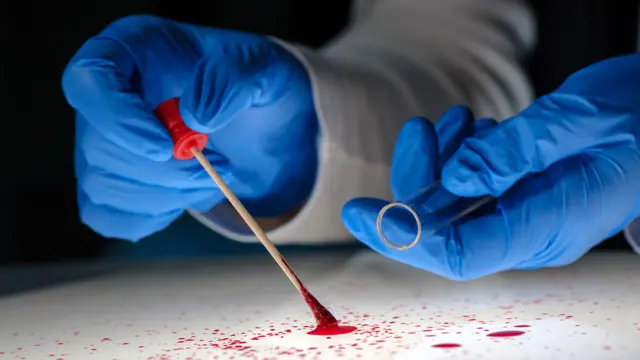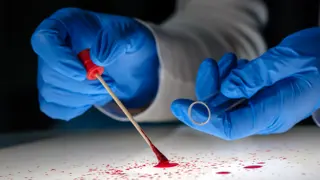
Forensic Science - Course
*CPD Accredited | *FREE PDF Certificate | Instant Result Access & Certificate | Expert Tutor Support | Lifetime Access
Training Edge
Summary
- Forensic Science - Course - Free
- Reed Courses Certificate of Completion - Free
- Tutor is available to students
Add to basket or enquire
Overview
Forensic Science
************************************
- FREE instant PDF Certificate
- CPD Accredited Course
************************************
Want to build a successful career in Forensic Science by gaining in Forensic Science?
Take a look at this Forensic Science course only where you will.
Not only learn in depth how to do Forensic Science with concrete actionable advices, tools, techniques, processes and methodologies but also
- Skill yourself by doing a Forensic Science course with us!
- Clear your doubts on this topic any time while doing the Forensic Science course
- Get Reed's 14 days Money Back Guarantee
Please remember that this Forensic Science course comes with Reed's 14 days Money Back Guarantee.
Certificates
Forensic Science - Course
Digital certificate - Included
Reed Courses Certificate of Completion
Digital certificate - Included
Will be downloadable when all lectures have been completed.
Curriculum
Course media
Description
Forensic Science
This Forensic Science course is designed to provide you with a comprehensive understanding of Forensic Science, empowering you to achieve excellence in this field and build a successful career.
Forensic Science - Course Outline
The Forensic Science course has 10 insightful Modules as detailed below:
Module 1: An Overview of Forensic Science
- What Is Forensic Science?
- Areas of Forensic Science
Module 2: Crime Scene Investigation
- Crime Scene Investigation
- First on the Scene
- Plan of Action
- Preliminary Survey
- Photography
- Sketch
- Chain of Custody
- Crime Scene Search and Evidence Collection
- Final Survey
- Submission of Evidence to the Laboratory
- Safety
- Sources and Forms of Dangerous Materials
- Universal Precautions
- Personal Protective Equipment
Module 3: The Nature of Evidence
- What Is Evidence?
- The Basis of Evidence: Transfer and Persistence
- Analysis of Evidence: Some Preliminary Considerations
Module 4: Pathology
- Cause and Manner of Death
- Coroners and Medical Examiners
- The Post-Mortem Examination (Autopsy)
- Laboratory Analysis
Module 5: Serology and Bloodstain Pattern Analysis
- Collection of Body Fluids
- The Major Body Fluids
- Bloodstain Pattern Analysis
Module 6: DNA Analysis
- The Nature of DNA
- Genes and the Genetic Code
- Population Genetics
- DNA Typing
- The Polymerase Chain Reaction (PCR)
- Short Tandem Repeats (STRs)
- Mitochondrial DNA (mtDNA)
- Comparison of DNA Samples
- Interpretation of DNA Typing Results: Purity Issues
Module 7: Forensic Toxicology
- Forensic Pharmacology and Forensic Toxicology
- Pharmacokinetics
- Drug Actions: Pharmacodynamics
- Identification of Drugs in the Body
- Drug Testing in the Workplace
- Forensic Toxicology of Ethyl Alcohol
- Measurement of Alcohol in the Body
- Field Sobriety Testing
Module 8: Fires and Explosions
- Fire
- Conditions for a Fire
- Types of Fires
- Recognition and Collection of Fire Scene Evidence
- Analysis of Fire Scene Residue Evidence
- Analysis of Fire Scene Accelerant Residues by Gas Chromatography
- Interpretation and Association of Fire Scene Evidence
- Explosions and Explosives
- Effects of Explosions
- Types of Explosives
- High- and Low-Order Explosions
- Explosive Trains
- Analysis of Explosives
Module 9: Friction Ridge Examination
- Fingerprinting
- Collecting Prints at a Crime Scene
- Principles of Friction Ridge Analysis
- Automated Fingerprint Identification Systems (AFIS)
- Identification
Module 10: Impression Evidence
- Footwear Impressions
- Tire Impression Evidence
- Serial Numbers Restoration
- Significance of Impression Evidence
Certificate of Achievement
As soon as you complete this Forensic Science, you can claim your certificate of achievement.
Buying for Your Team?
You can buy this Forensic Science course for your colleague or members of your team by simply adding the Forensic Science course to the basket. You can add the student's details and a message at checkout.
Who is this course for?
Forensic Science
This course is for anyone interested in Forensic Science
Requirements
Forensic Science
This course is for anyone interested in Forensic Science
Career path
Forensic Science
Questions and answers
Currently there are no Q&As for this course. Be the first to ask a question.
Reviews
Currently there are no reviews for this course. Be the first to leave a review.
Legal information
This course is advertised on reed.co.uk by the Course Provider, whose terms and conditions apply. Purchases are made directly from the Course Provider, and as such, content and materials are supplied by the Course Provider directly. Reed is acting as agent and not reseller in relation to this course. Reed's only responsibility is to facilitate your payment for the course. It is your responsibility to review and agree to the Course Provider's terms and conditions and satisfy yourself as to the suitability of the course you intend to purchase. Reed will not have any responsibility for the content of the course and/or associated materials.


